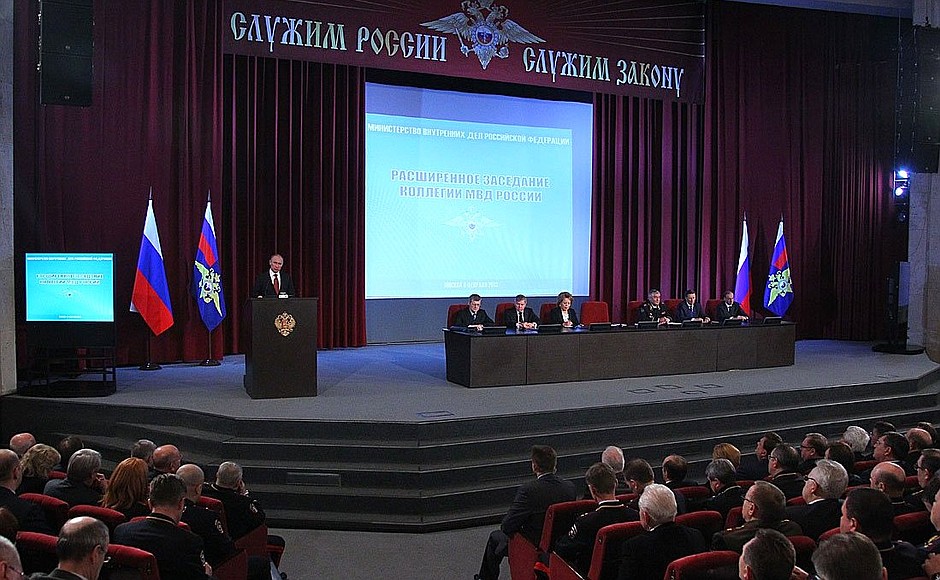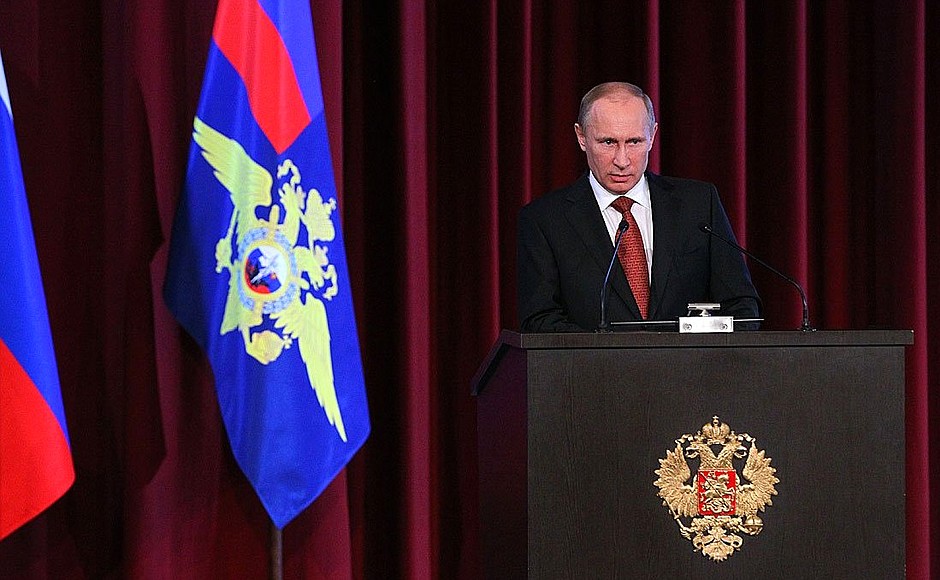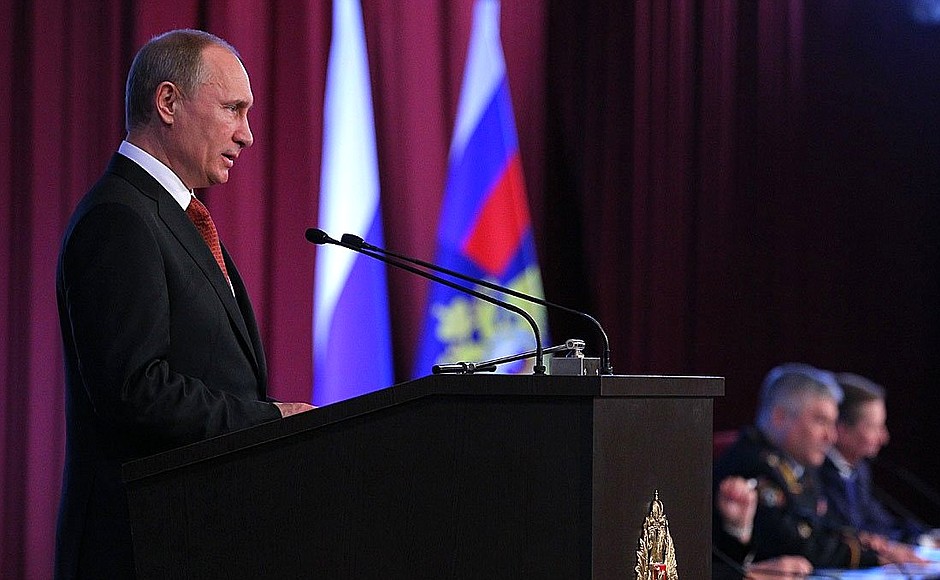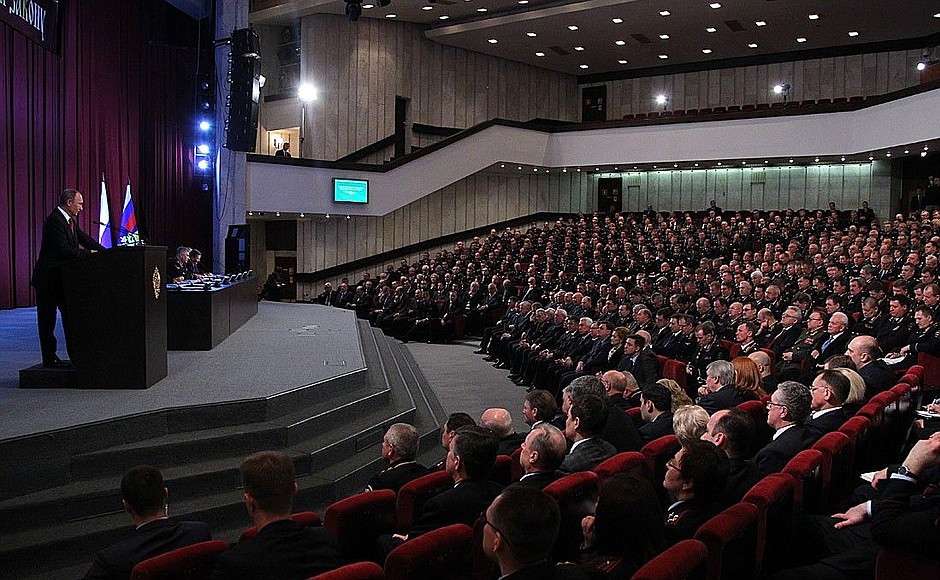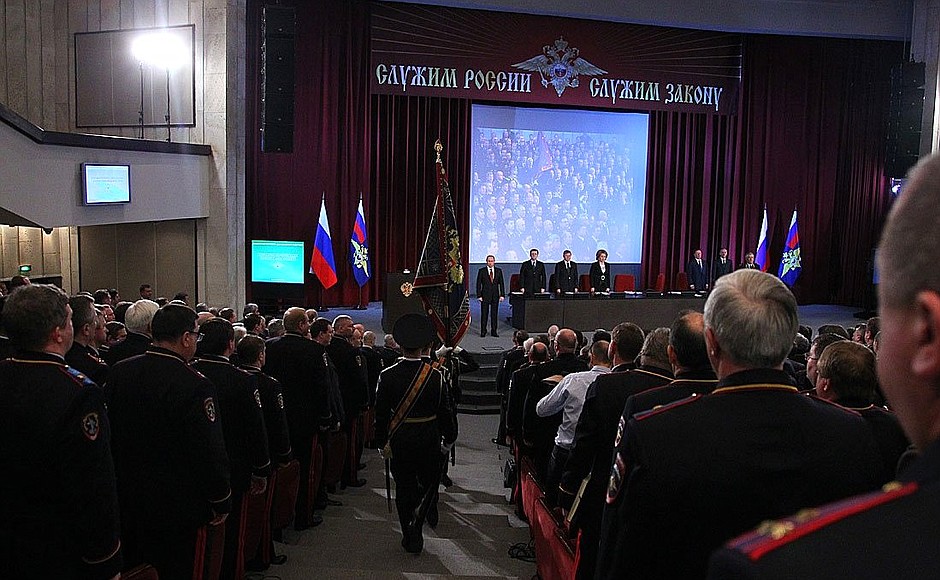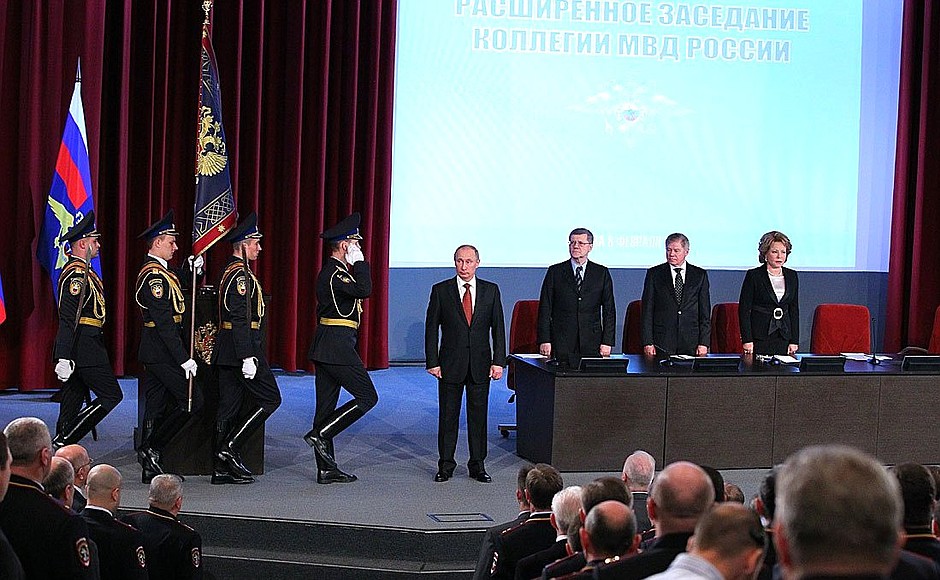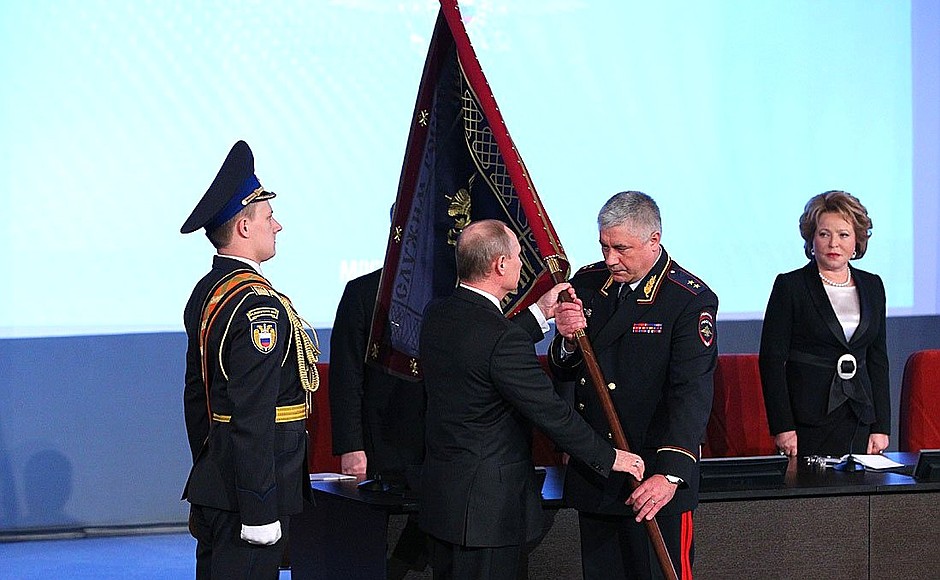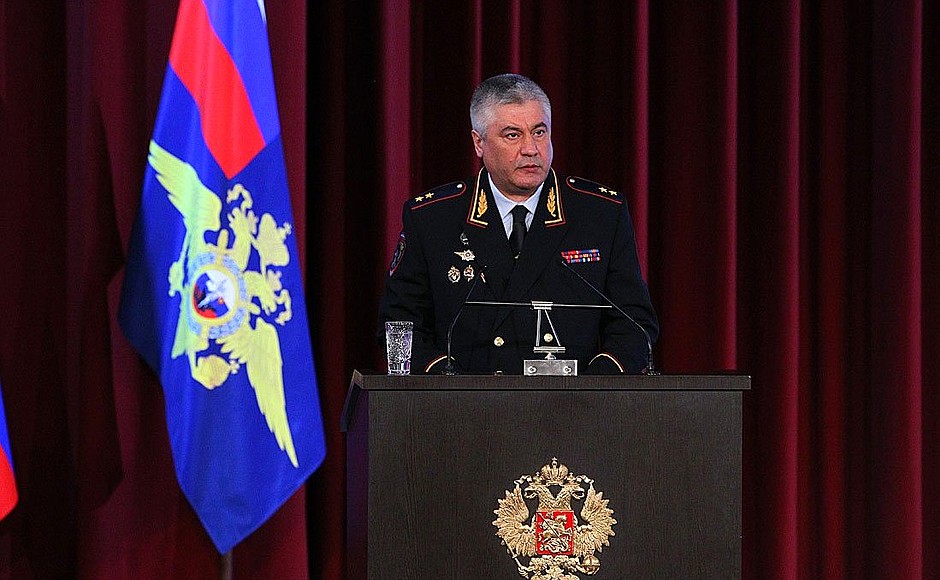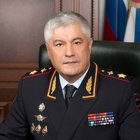The President presented Interior Minister Vladimir Kolokoltsev with the Interior Ministry Banner – the ministry’s official symbol.
* * *
President of Russia Vladimir Putin: Comrades,
We are here today to review the Interior Ministry’s results for 2012.
The Interior Ministry has always played a key part in Russia’s law enforcement system, and not just in the law enforcement system, but in the state government system in general. Your work is such that you have to use new and more effective methods to enforce the law, respond more flexibly to the changes in the country and society and take the emergence of new challenges into account.
I will mention the tasks that require the Interior Ministry’s particular attention over the coming year.
As before, guaranteeing the safety of our citizens and society in general and continuing the offensive against crime are top priorities.
I note that the total number of registered crimes fell by 4.3 percent last year. But a number of regions have posted a rise in unsolved crimes and this is a worrying development. Overall around Russia we have nearly 45 percent (44.4 percent to be exact) of crimes going unsolved – practically one in every two crimes committed. This is a clear sign that the Interior Ministry must make its work more effective.
”The situation on the country’s roads remains difficult despite the measures taken. The State Duma is scheduled to examine during the spring session a draft law that will considerably toughen the penalties for drunk driving. I stress the point that drivers must know that they will not be able to avoid responsibility in this area. Everyday corruption on the roads must also be stamped out.“
I have said it before and will say it again now: people who turn to the Police for protection of their rights and property must receive real help. The high rate of unsolved crimes and the fact that criminals are going unpunished do not help to restore justice and have a negative impact on public confidence in the law enforcement agencies and in the state in general.““
I ask you to give your utmost attention to raising the effectiveness of operative and investigative work at all levels. You also have to beef up the measures for ensuring law and order in public places. The statistics show that one in three crimes is committed in this area, and the total number of such crimes increased by more than 12 percent last year.
This situation is the cause of serious tension and a source of concern and complaints from the public. People’s feeling of personal safety and the safety of their children and families begins with law and order on the streets of our towns and cities, in our yards and building entrances, in parks and at schools.
The situation on the country’s roads remains difficult despite the measures taken, including through federal and regional targeted programmes. We had some improvement in this situation two or three years ago, but today, people are seriously worried by the increasing number of traffic accidents involving drunk drivers. Many of you here are specialists working in precisely this area and know the situation, but let me remind those who might not know the figures that 203,600 traffic accidents were registered in 2012, as a result of which 28,000 people were killed and 258,600 people were injured. These figures read more like reports from a war zone.
The State Duma is scheduled to examine during the spring session a draft law that will considerably toughen the penalties for drunk driving. I stress the point that drivers must know that they will not be able to avoid responsibility in this area.
We also should develop measures, including organisational and technical measures, to make checks of drivers more effective and make greater use of the latest technology and innovations in road accident prevention. Of course, everyday corruption on the roads must also be stamped out. This is something we must combat in systematic fashion.
Combating extremism remains one of the Interior Ministry’s top priorities. Xenophobia and ethnic and religious prejudice threaten our multi-ethnic people’s unity and Russia’s integrity as a state.
You must act firmly to prevent extremist organisations’ activities and take swift action against any forms of extremism, no matter from which quarters they come.
I stress the point too, that we are working steadily towards creating the environment for active political life in our country and fair and honest political competition. These are essential conditions for our country’s and society’s development. But the political battle and public discussion must remain within the Constitution’s limits and not erode and destroy our country’s and society’s foundations.
”The upcoming 2013 Universiade in Kazan and the Winter Olympics and Paralympics in Sochi in 2014 will also require security measures of the highest standard.“
We have a duty not only to ensure protection of human rights and civic freedoms, but a direct duty too, to protect each and every one of our citizens. I therefore repeat the point that no extremist activity can go unpunished.
Let me say a few words on the fight against terrorism. There were 637 terrorism-related crimes registered in 2012, including 24 terrorist attacks.
As you know, the bandits stop at nothing and act in cynical and base fashion. The terrorist attacks against Muslim spiritual leaders in Tatarstan and other Russian regions drew a sharp response from the public. More than 50 members of the Muslim clergy have been killed by bandits over the last 10 years in the North Caucasus. We are to guarantee these people’s security.
It is the Interior Ministry’s job to respond immediately to any information on crimes being planned. The lessons of Nord-Ost, Beslan and Buinaksk show that any delay or negligence can turn into a terrible tragedy.
Together with the National Anti-Terrorism Committee, you must improve the level of protection throughout the transport infrastructure and in other places with large numbers of people. Of course, the upcoming 2013 Universiade in Kazan and the Winter Olympics and Paralympics in Sochi in 2014 will also require security measures of the highest standard. I know that you are already working hard on this. I just discussed this matter with the [Interior] Minister in Sochi. I ask you to continue working decisively and in close cooperation with your colleagues from the other agencies and with the regional authorities.
One of the Interior Ministry’s priorities is the fight against organised crime, including transnational and ethnic-based criminal groups.
You must work more actively to track down the criminal networks that try to suck a parasite living out of the growing economic ties between Russia and its neighbours, especially within the Customs Union and the Common Economic Space. We must suppress all forms of smuggling channels.
”One of the Interior Ministry’s priorities is the fight against organised crime, including transnational and ethnic-based criminal groups.“
Decriminalising the economy and fighting corruption are still top priorities on the Interior Ministry’s agenda today. Protecting honest business from all forms of unlawful infringements is not just a priority for the ministry but is a matter of our national development, and I want you all to be clear about this.
I ask you too, to give particular attention to improving the situation in housing and utilities sector and ridding it of the various shadowy schemes, thievery and corruption that we find there. This is an area where you must work in close cooperation with our citizens, public organisations and local authorities.
Developing the state measures for crime prevention is also the order of the day. The State Duma is due to examine soon a draft law On the Foundations of Russia’s Crime Prevention System. This draft law sets out basic policy in organising prevention work, clarifies the powers of the different actors in this work, and essentially completes the creation of a full-fledged legal framework in this area.
Colleagues, last year, following the transition to financing from a single source – the federal budget – the Interior Ministry’s budget doubled compared to 2011. This made it possible to double the wages of Interior Ministry officers and servicemen in the Interior Ministry troops. I note in passing their effective work in conflict zones, where they have shown bravery and dedication in their work. They are the backbone of our fight against the most serious crimes today and I wish them good luck and success.
Turning to social issues, spending on housing provision increased 6-fold, from 3.6 billion rubles [$100 million] in 2011 to 22.6 billion rubles in 2012.
”Decriminalising the economy and fighting corruption are still top priorities on the Interior Ministry’s agenda today. Protecting honest business from all forms of unlawful infringements is not just a priority for the ministry but is a matter of our national development.“
The Interior Ministry’s specialised housing fund also grew substantially. More than 5,000 people received money to buy or build houses. This year, another 3.3 billion rubles will be spent on this purpose.
The state authorities will continue raising the level of social protection for Interior Ministry personnel and Interior Ministry Troops, and will do everything required to ensure that service in the Interior Ministry is prestigious and the honest and competent professionals will be deservedly rewarded for their work, both morally and financially.
At the same time, the Interior Ministry must continue improving its personnel. The ministry’s officials have the dual task today of holding onto experienced professionals capable of tackling the most difficult tasks and selecting young specialists who meet the highest modern standards. This is an essential condition for the Interior Ministry’s effective work and continued development.
Comrades,
It is my pleasure today to carry out the honourable mission of presenting the Interior Ministry with its main official symbol – the Interior Ministry Banner. The Banner unites many generations of Interior Ministry officers and embodies the best traditions of your service over the Ministry’s more than 200-year history.
I am sure that the Interior Ministry’s personnel will look after the Banner’s honour and be worthy in continuing their predecessors’ cause, protect law and order and people’s lawful interests and security and will always act professionally, bravely and responsibly.
I thank you all for your work and wish you success and all the very best.
<…>
